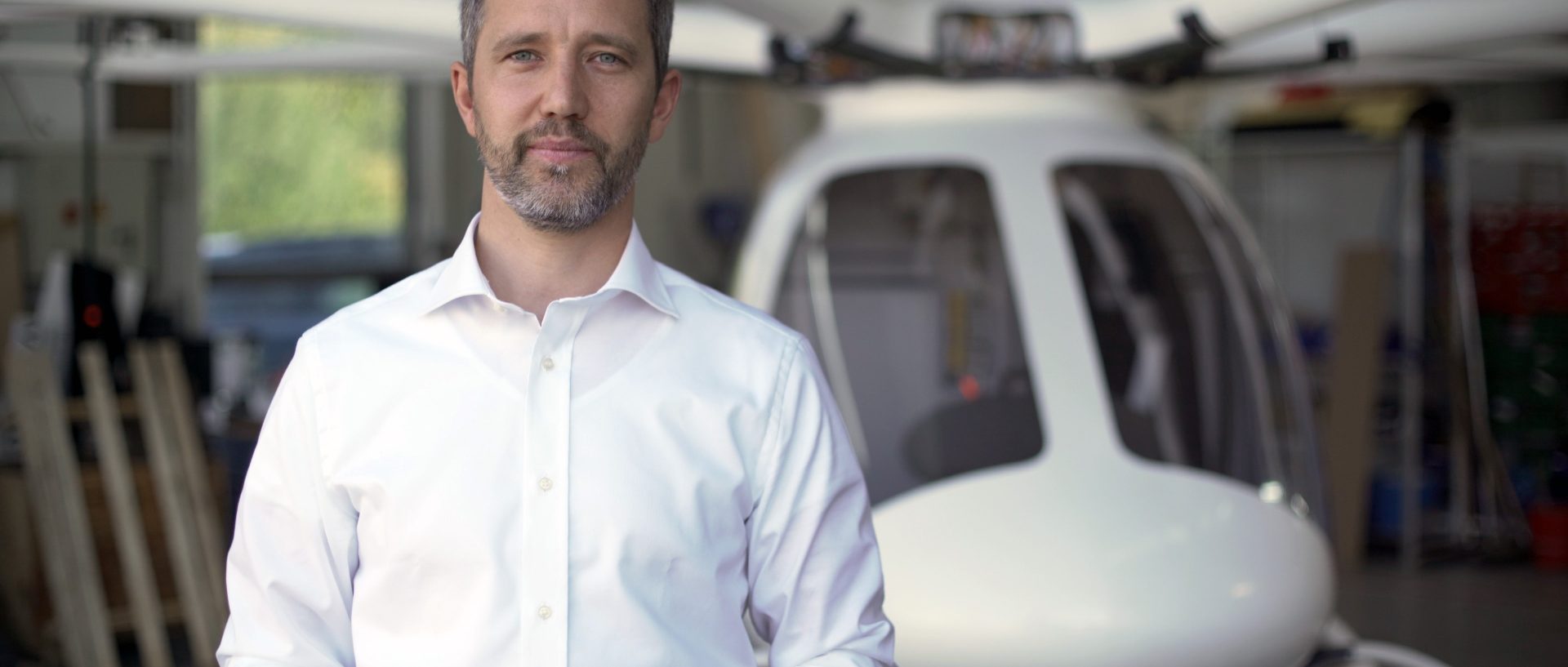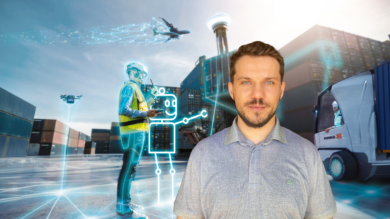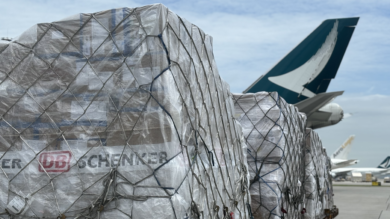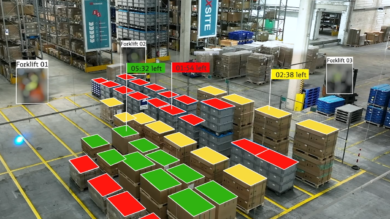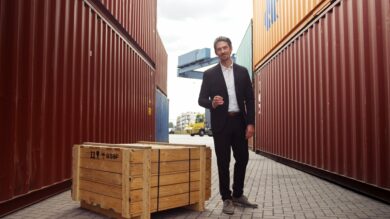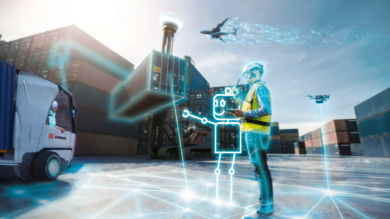Drones are a promising innovation for logistics, making supply chains of the future more efficient and sustainable with many fields of application. German start up Volocopter is a pioneer of urban air mobility, developing an entire ecosystem including cargo drones and air taxis, alongside their corresponding infrastructure and management systems. Volocopter additionally teamed up with logistics service provider DB Schenker to further develop their VoloDrone for supply chains of the future. The VoloDrone is a heavy-lift cargo drone with a payload of up to 200 kilograms and a reach of 40 kilometers.
Logistics Matters interviewed Florian Reuter, CEO of Volocopter, on the general application of cargo drones and air taxis, including what they can do for the logistics industry, and what the future will look like.

Logistics Matters: At Volocopter, you are currently working on nothing less than the future of mobility via cargo drones and air taxis: fully autonomous, electric, and sustainable. So, when will we see air taxis in our cities?
Florian Reuter: “We will already open the first commercial routes within three years! Air taxis and specifically our VoloCity are not a far-away future but will soon become part of everyday life for all of us.
We started developing our technology almost a decade ago. At that time, improvements of several different technologies like battery density, processor power and lightweight sensors, amongst others, made this kind of electrical flight possible for the first time. You can imagine how exciting it was to see the first person take off electrically in 2011.
Back then, we were pioneers in a new era of aviation and considered crazy by most people for even attempting to upsize drone technology to be able to carry people. Our successes tell a very different story though.
“We are thrilled that we will soon be able to bring this technology in the form of electrically powered air taxis to metropolitan areas around the world.”
When we were flying over the Marina Bay in Singapore towards the end of 2019, right in the city center surrounded by skyscrapers, we could truly demonstrate how air taxis will integrate into cityscapes going forward. That was a real goose bump moment for me.”
Logistics Matters: And what can drones do for the logistics industry in particular?
Florian Reuter: “We got a lot of interest in our technology right from the start. Very early on, we were invited by NASA to give a workshop on our technology. About five years into the journey, we started to get an increasing number of requests for a cargo drone solution from businesses all around the world.
So, based on our Volocopter platform, we created the VoloDrone. It’s a heavy-lift drone that can carry up to 200 kilograms over a distance of 40 kilometers in a straight line no matter what the terrain, and that is with current battery technology that is fit to certify. Of course, with further improvements on the battery side, the performance indicators will go up. Even today, with our quick battery change approach, we can offer a number of relevant use cases.
“The VoloDrone can assist in the logistics industry to address the middle mile. It is unique because it is emission free in flight and while it offers many of the advantages of a helicopter, it is much cheaper and significantly quieter in operations.”
With regards to what can be transported, we have opted for the most flexible solution. So various shapes of freight can be attached to the generic cargo holding rails of the VoloDrone.
Logistics operators can especially benefit from the VoloDrone’s versatility as it can fly over heavy traffic, bodies of water, offer shore-to-ship deliveries, mountain deliveries and construction side support.
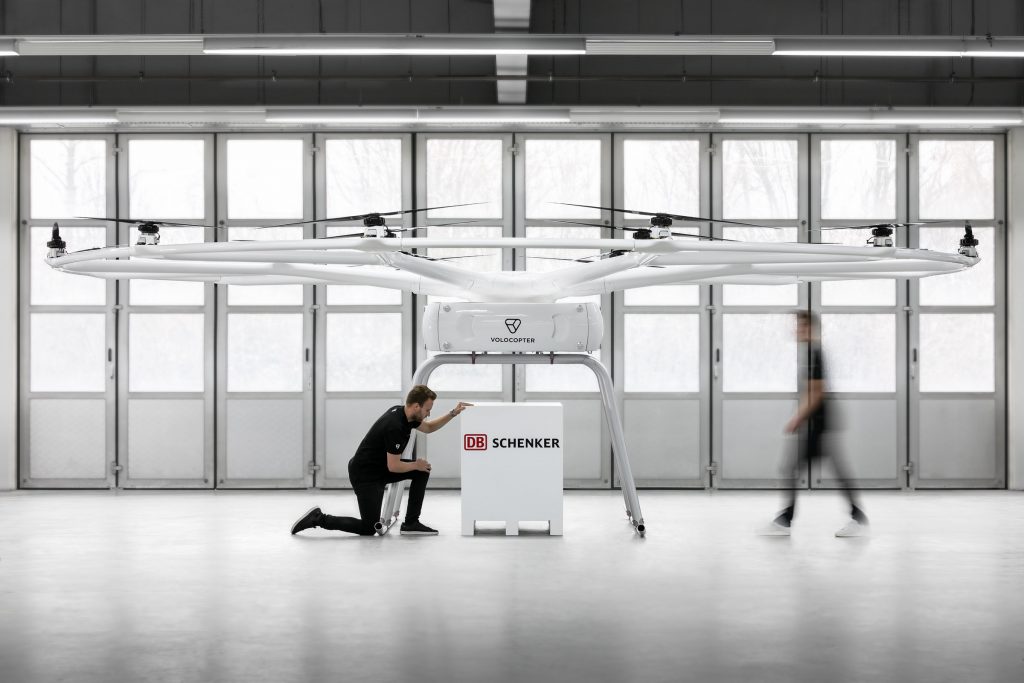
In order to facilitate fleet management, since we expect logistics operations to have several VoloDrones in use at any one time, we have created VoloIQ. This is our digital platform to ensure that our intelligent, sensor equipped aircraft adapts to respective regulatory and terrain specific conditions automatically and feeds all information back into the VoloIQ system in real time, which we develop jointly with Lufthansa.
Our ultimate goal is a fully autonomous, silent, and electrically flying VoloDrone able to operate in all environments including densely populated megacities. We are already far advanced in terms of certification with our VoloCity air taxis aircraft with the European Union Aviation Safety Authority (EASA). They ensure that we are adhering to the highest safety standards in aviation and will allow us to fly with passengers in densely populated areas. This gives us an advantage in making the VoloDrone equally safe.
Logistics Matters: Since the beginning of 2020, Volocopter has a partnership with DB Schenker to further develop the VoloDrone, a heavy-lift cargo drone. What is the reason behind this partnership?
Florian Reuter: “We are experts in developing safe electrical takeoff and landing aircraft (eVTOL) and in creating operations for these new types ofaircraft. There is a great demand for a cargo version of our aircraft, and we responded to that by creating the VoloDrone.
However, we are not experts in logistics per sé and are happy to be partnering with one of the leading logistics companies globally. We jointly work on offering extra value to logistics, soon.
The potential for using heavy-lift electric drones is huge. We are open to learning about further application ideas and are happy to evaluate pre-order requests to equip our customers as soon as possible. It’s an exciting journey.”
Logistics Matters: And when will we see the VoloDrone in action for the first time?
Florian Reuter: “Actually, you can already watch it in action on our YouTube channel.
And we will showcase a first use case application later this year. Unfortunately, I cannot say much more about that yet. But anybody following on our social channels or on this blog will be amongst the first to find out.”
Logistics Matters: What will the future look like for cargo drones and air taxis – both in general and within the logistics industry?”
Florian Reuter: “Drone technology will become widely integrated into our daily mobility. Whether by air taxis bringing people to their destination, middle mile logistics, or by small drones making last mile deliveries of packages ordered online. They will improve our quality of life in cities and the countryside.
I have heard worries of a couple of people that our skies will go dark due to the number of drones in the air, which I know will not happen. The beauty of technology is that it gives us opportunity and as a society, we can decide how this will be integrated into our lives, so it actually delivers a true benefit. The same applies to drones, they will only be used in a format where their added value to society outweighs the possible downside. Let me tell you that once the Volocopter is up in the air at 100 meters, you see nothing but a little white dot.
“What will the future of drones look like for the logistics industry? They will have the biggest impact in use cases where they will enhance efficiency and increase availability of products and services especially in time critical and cost sensitive environments.”
I believe we are only seeing the humble beginnings of a much more profound transformation that will occur in our mobility paradigms over the coming decades. I don’t think we have fully realized the opportunity given to us by cargo drones and air taxis.”


